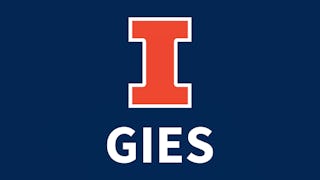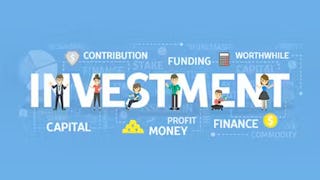In Introduction to Finance: The Role of Financial Markets, you will be introduced to the basic concepts and skills needed for financial managers to make informed decisions. With an overview of the structure and dynamics of financial markets and commonly used financial instruments, you will get crucial skills to make capital investment decisions. With these skills, you will be ready to understand how to measure returns and risks and establish the relationship between these two. The focus of this course is on basic concepts and skill sets that will have a direct impact on real-world problems in finance. The course will enable you to understand the role of financial markets and the nature of major securities traded in financial markets. Moreover, you will gain insights into how to make use of financial markets to create value under uncertainty.

Cultivate your career with expert-led programs, job-ready certificates, and 10,000 ways to grow. All for $25/month, billed annually. Save now


Introduction to Finance: The Role of Financial Markets

Instructor: Xi Yang
12,109 already enrolled
Included with 
(73 reviews)
What you'll learn
Understand and apply the time value of money in order to value financial and real asset investments, and to make investment decisions.
Master capital allocation across time, with an ability to analyze capital budgeting problems in a firm.
Understand the basics of measuring risk and return and the trade-offs.
Understand the structure of bond market and stock market.
Details to know

Add to your LinkedIn profile
25 assignments
See how employees at top companies are mastering in-demand skills


Earn a career certificate
Add this credential to your LinkedIn profile, resume, or CV
Share it on social media and in your performance review

There are 5 modules in this course
In this course, you will be introduced to the basic concepts and skills needed for financial managers to make informed decisions. With an overview of the structure and dynamics of financial markets and commonly used financial instruments, you will get crucial skills to make capital investment decisions. With these skills, you will be ready to understand how to measure returns and risks, and establish the relationship between these two. The focus of this course is on basic concepts and skill sets that will have a direct impact on real-world problems in finance. The course will enable you to understand the role of financial markets and the nature of major securities traded in financial markets. Moreover, you will gain insights into how to make use of financial markets to create value under uncertainty.
What's included
1 video7 readings1 assignment1 discussion prompt
In this module, you will be introduced to basic terms of bonds: coupons, face value, coupon rate, maturity, and yield to maturity. You will be presented with the ways to value level-coupon bonds and zero-coupon bonds. You will learn why companies would like to have their bonds rated, and what the factors are that determine the bond ratings. You will also identify the structure of bond market and the major players of the bond market.
What's included
8 videos2 readings6 assignments1 peer review
In this module, you will learn the basics of stock valuation. You will be presented with the fundamentals of stock market structure, and how companies issue stocks in the market. In addition to that, you will explore the different types of stocks, including common stocks and preferred stocks. You will also identify/find how to get real-time information of individual stocks, and how to read stock quotes.
What's included
8 videos2 readings6 assignments
This module is the application of the capital budgeting process. First, you will learn/encounter/see/be exposed to some common scenarios when we evaluate which cash flow should be accounted for in the capital budgeting analysis. Then, you will be introduced to the treatment of after-tax salvage value and accelerated depreciation schedule. This information will be combined to determine whether a project is worthwhile to explore or not. You will also discuss the impact of inflation on capital budgeting decisions. As a result, this module will help you establish a big picture of the company’s investment decisions.
What's included
7 videos2 readings6 assignments
In this module, you will review the historical record of return and risk for major categories of financial instrument, and reveal that there exists a trade-off between risk and return. You will also learn how to calculate return and risk based on the real data collected from financial markets. The trade-off between risk and return reveals that investors should set reasonable expectations of return based on their risk preferences.
What's included
9 videos4 readings6 assignments1 peer review
Instructor

Offered by
Recommended if you're interested in Finance


University of Illinois Urbana-Champaign


University of Geneva


Università di Napoli Federico II


Indian School of Business
Build toward a degree
Why people choose Coursera for their career




Learner reviews
73 reviews
- 5 stars
79.45%
- 4 stars
8.21%
- 3 stars
6.84%
- 2 stars
1.36%
- 1 star
4.10%
Showing 3 of 73
Reviewed on Mar 1, 2023
it gives us the best insights and basic understanding of financial world.
Reviewed on Nov 15, 2020
Great course! Everything is clearly explained and the instructor is great. Thank you for offering this course.
Reviewed on Dec 13, 2020
Great content on the financial markets and a solid format to learn the fundamentals on this subject matter.
New to Finance? Start here.

Open new doors with Coursera Plus
Unlimited access to 10,000+ world-class courses, hands-on projects, and job-ready certificate programs - all included in your subscription
Advance your career with an online degree
Earn a degree from world-class universities - 100% online
Join over 3,400 global companies that choose Coursera for Business
Upskill your employees to excel in the digital economy
Frequently asked questions
Once you enroll for a Certificate, you’ll have access to all videos, quizzes, and programming assignments (if applicable). If you choose to explore the course without purchasing, you may not be able to access certain assignments.
You will be eligible for a full refund until 2 weeks after your payment date. You cannot receive a refund once you’ve earned a Course Certificate, even if you complete the course within the 2-week refund period. View our full refund policy.
Yes! Coursera provides financial aid to learners who would like to complete a course but cannot afford the course fee. To apply for aid, select "Learn more and apply" in the Financial Aid section below the "Enroll" button. You'll be prompted to complete a simple application; no other paperwork is required.
More questions
Financial aid available,


